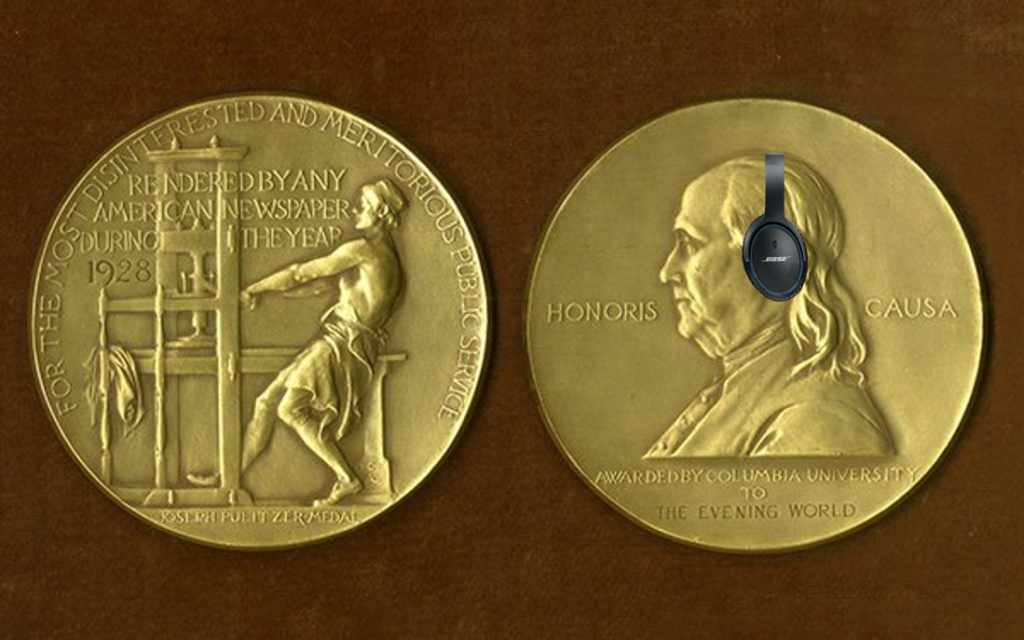
Like most professional industries, radio broadcasters often focus on honoring their work – usually in the form of awards. Visit most radio stations, and you’ll often see a trophy case of trophies, plaques, and other commemorative items, recognizing the efforts of radio professionals – in programming, sales, production, and community service.
While these awards carry different levels of prestige, it’s the Marconi glass that most stations covet. You can watch the tension and anxiety every fall at the Radio’s Show’s annual evening where these awards are bestowed on radio pros representing various formats, market sizes, and job titles.
But last week, the news out of New York City is that the most esteemed prize in journalism will – for the first time – have an audio component. The Pulitzer folks aren’t promising this award will be around for the long run, but at least for 2020, an audio journalist will be honored.
Here’s the catch:
The Pulitzer’s new category is “Audio Reporting” and it’s being described as “experimental.” Will it be around in 2021 and beyond? It would seem the Pulitzer team will see how it goes this year.
Appropriately, here’s the audio announcement from Pulitzer Administrator Dana Canedy:
The award will honor “radio programs or podcasts,” an obvious nod to the audio renaissance taking place in our media ecosystem. The Pulitzer team refers to both reporting and storytelling, components that while similar, are often more specific to broadcasting and podcasting respectively. (Our friends in public radio would beg to differ as they typically bring both attributes to the party.)
But as MediaPost’s Melynda Fuller notes, the new award is most likely to have been influenced by the podcasting explosion. While podcasts run the gamut from serious to frivolous topics, most news organizations have jumped into the audio on-demand waters. Many have created truly great shows that exhibit strong journalism and reporting.
It wouldn’t be surprising to see podcasting entries for this new Pulitzer category from entities like The New York Times whose “The Daily” podcast has become an everyday audio staple for millions, as well as NPR and other public radio groups whose audio on-demand shows have become highly popular.
Nieman Lab‘s Laura Hazard Owen was more direct about the podcasting influence, noting that some radio pros weren’t especially excited by the Pulitzer committee finally getting around to acknowledging audio journalism.
Perhaps the most sarcastic came from Marketplace anchor Kai Ryssdal, a broadcaster and a podcaster with a well-tuned instinct for recognizing trends…and truths:
So…yay, an audio Pulitzer.
But this, from Pulitzer administrator Dana Canedy…
“The renaissance of audio journalism in recent years…”
Puh.
Leeze.
We’ve been here the whole damn time. https://t.co/BDYQVumbLq
— Kai Ryssdal (@kairyssdal) December 5, 2019
So, maybe this new 15th Pulitzer category will spark an old-fashioned competition between broadcasters and podcasters. While we have successfully brought both groups together at the Podcast Movement conference during the past several years, it’s hard to see the palpable friction that exists between both camps.
Perhaps the Pulitzer committee isn’t as blind to the situation as it may appear, knowingly generating some competitive fire between those who ply their craft over the airwaves versus the growing number of producers cranking out audio on-demand podcasts.
Whatever the case may be, it is an acknowledgment of audio long overdue, given that radio journalism has been in existence for nearly a century. The Pulitzer people indicate this new “audio reporting” prize is an experiment. Hopefully, broadcasters and podcasters won’t scratch each other’s eyes out, vying for the award.
Crank up your speakers and strap on your earbuds.
May the best audio win.
The official Pulitzer release with submission deadlines is here.
- Media And Technology In 2025: Believe It Or Not! - April 18, 2025
- In Radio, You Just Never Know - April 17, 2025
- The Secret To Making A Great Podcast (And Great Radio) - April 16, 2025




First you need to create top-rate meaningful content. Not easy, but a worthwhile pursuit. The payoff is in owning a deserved slot among your community leaders. And the satisfaction that you really ARE doing something to make a difference.
To have a shot at the prize you need lots and lots of time and effort to prepare your entry. Some just hire a professional writer with understanding of impressive verbiage befitting for such a
presentation. Like using big words and pseudo intellectual ramblings.
I’m lazy. I just send in the annual solicitation from Who’s Who (with my check) so I can have that on my bookshelf. If I were a doctor I’d buy the “Best Doctors In America” inserts in airline magazines.
I’m with Bobby! When it comes to using big words and pseudo intellectual ramblings, I prefer to eschew obfuscation!
Why am I getting an unmistakable feeling of cognitive dissonance with your comment?
I’m hopeful snagging a Pulitzer will take a little more effort. 🙂 Good to hear from you, Bobby.